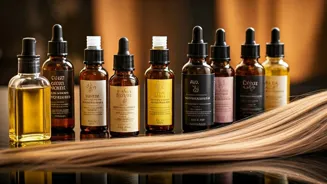Essential Oils Unveiled
Embarking on a journey to enhance hair growth and density often involves exploring the power of natural oils. Selecting the ideal oil involves understanding
its unique properties. Oils are packed with nutrients and other substances that can support scalp health and stimulate hair follicles. Understanding the composition of each oil, from fatty acids to vitamins and minerals, helps in making informed choices. These oils offer distinct benefits for hair's well-being, be it boosting shine or bolstering overall strength. Integrating these oils into your routine could significantly alter your hair's condition, making it longer, thicker, and overall more vibrant. Furthermore, regular use of these oils can also tackle common hair-related challenges, such as dryness and damage.
Argan Oil's Magic
Argan oil, a popular choice for hair care, is rich in antioxidants and essential fatty acids. These ingredients provide essential moisture and nourishment to the hair. It's known for its ability to tame frizz and enhance shine. Argan oil can be used on all hair types, making it a versatile option. To apply, a small amount can be massaged into the scalp or spread through the hair. Regular use helps to maintain hydration and promote healthier, stronger hair, and its moisturizing properties are particularly beneficial for dry or damaged hair. For maximum impact, it is advisable to use argan oil consistently. Remember that consistent use is crucial to experiencing the transformative effects of this oil, allowing it to work its magic from root to tip.
Coconut Oil Benefits
Coconut oil is another widely celebrated hair care product. Its structure helps it to penetrate the hair shaft effectively, reducing protein loss, which is essential for hair strength. The oil is also known to have moisturizing properties. Using coconut oil before washing your hair protects it from the harshness of shampoos. It can also be applied after washing to add moisture and shine. Regular application makes hair softer, reduces breakage, and promotes hair growth. Coconut oil is especially effective for those with dry or damaged hair, where it acts as a deeply moisturizing treatment. Its versatile properties and ease of use make it a staple in many hair care routines.
Jojoba Oil's Role
Jojoba oil closely mimics the natural oils produced by the scalp, making it an excellent moisturizer. It helps regulate sebum production, which can be particularly beneficial for those with oily or dry scalps. This oil is rich in vitamins and minerals that nurture the hair and scalp, promoting healthy growth and improved hair health. Jojoba oil is lightweight and can be used as a leave-in conditioner, or added to your regular hair masks and conditioners. Its non-greasy nature means it easily absorbs without weighing the hair down. Its use can improve hair elasticity, reduce breakage, and add natural shine. It is a versatile oil for various hair types, contributing to overall hair health.
Castor Oil's Strength
Castor oil is praised for its potential to promote hair growth. Rich in ricinoleic acid, castor oil enhances blood circulation to the scalp. This improved circulation provides vital nutrients to hair follicles, which might stimulate growth and prevent hair loss. Its thick consistency helps seal moisture into the hair. Regularly massaging castor oil into the scalp and hair can make hair stronger, thicker, and less prone to breakage. It is often used to condition hair, treating dry or damaged areas, especially split ends. It is best to use it with other lighter oils to make it easier to apply and to avoid any feeling of heaviness.
Almond Oil's Nourishment
Almond oil is a gentle and highly nourishing hair oil. It is rich in vitamin E, a powerful antioxidant that may protect hair from environmental damage. Almond oil can hydrate and smooth hair cuticles, thus reducing breakage and adding shine. Using almond oil can improve hair elasticity and strength, reducing hair fall and promoting healthy hair. It is easily absorbed into the hair shaft, making it suitable for all hair types. Its lightweight nature makes it a great addition to daily routines. Application can be done before washing hair or as a leave-in conditioner after washing, promoting overall hair health and resilience.
Rosemary Oil's Effects
Rosemary oil has gained popularity for its benefits in hair growth. It has been found to improve circulation in the scalp, which supports the supply of nutrients to hair follicles. By doing this, rosemary oil supports hair thickness and might slow down premature hair loss. Although highly beneficial, rosemary oil is best used in a diluted form, since it is very concentrated, which may cause scalp irritation if not used correctly. It can be mixed with a carrier oil, such as coconut or jojoba oil, and applied to the scalp. Consistent application may lead to improved hair growth, and enhanced scalp health. Those who are interested in boosting the health and growth of their hair may find rosemary oil an excellent choice.
Tea Tree Oil's Impact
Tea tree oil is known for its antimicrobial and anti-inflammatory properties. It can help clear clogged hair follicles, which promotes better hair growth and reduces the build-up of dead skin. Its use may help reduce dandruff and other scalp conditions. Always dilute tea tree oil with a carrier oil. Tea tree oil helps soothe the scalp, which provides a healthy base for hair growth. It helps cleanse and maintain a balanced environment for the scalp. Consistent use can result in a healthier, cleaner scalp, and improve hair health. Its properties work to promote overall hair well-being.
Grape Seed Oil's Role
Grape seed oil is a lightweight oil that is rich in antioxidants. It assists in locking in moisture and providing hair with its vital nutrients. It has the ability to strengthen hair strands and guard them against damage. Grape seed oil’s non-greasy texture allows for it to be easily absorbed, making it ideal for all hair types. Massaging it into the scalp improves blood flow, and can result in a healthier scalp. It is often used as a heat protectant due to its ability to resist heat. Those who use grape seed oil regularly notice an improvement in their hair’s strength and shine. Its use can result in improved hair elasticity and overall vitality.
Lavender Oil's Benefits
Lavender oil is known for its soothing and relaxing properties, as well as its potential to promote hair growth. Its benefits extend to the scalp, helping to calm irritation and encourage a healthy environment for hair growth. Lavender oil has properties that help improve hair volume and reduce hair loss. It also brings a calming effect to the scalp. Lavender oil is often used in aromatherapy, which helps to alleviate stress, which also contributes to hair health. It's important to dilute lavender oil with a carrier oil before application, ensuring safety and effectiveness. It is a versatile oil that is ideal for people looking to improve both hair health and a calming effect.












